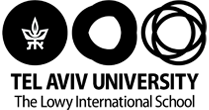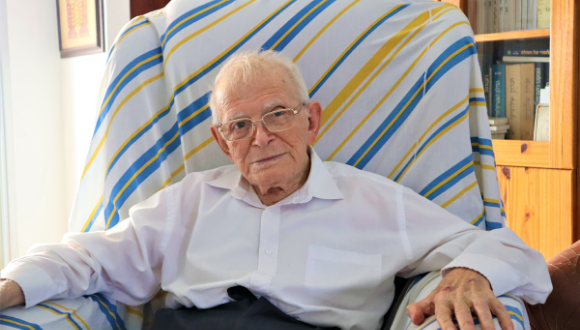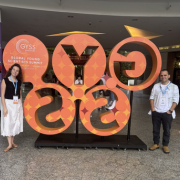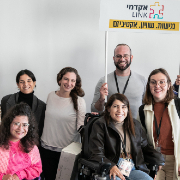Sharing Stories of the Holocaust and Survival
In honor of International Holocaust Remembrance Day, read TAU International student, Athanasios Katsikidis, interview Holocaust survivor and writer, Moshe Ha-Elion.
My name is Athanasios Katsikidis, a Master's degree student at Tel Aviv University in the field of Security and Diplomacy. I decided to choose Tel Aviv University to further enhance and deepen my knowledge on Security and Diplomatic aspects while serving as a Greek Columnist at Politically Incorrect (Incorrect.gr) website and Freelance Columnist at Greek newspapers.
My passion for historical events that occurred in the previous century captured my mind, therefore to deeper understand the facts I started to meet and present the stories of War Veterans, Politicians, and personalities who shaped the world.
While combining both academic excellence and historical research I had the honor to meet in Bat Yam, Israel, a great person, a survivor of Nazis crimes, Mr. Moshe Ha-Elion, whose story began in the co-capital of Greece, Thessaloniki, from which he was forced to leave and transferred consecutively into 4 Nazi concentration-death camps on Auschwitz, Mauthausen, Melk, and Ebensee.
Below is a summary of a wider interview, in which Colonel (ret.) Ha-Elion describes his journey and the first dramatic days in Auschwitz.
Watch the full interview with Moshe (in Greek), by Athanasios, HERE
Athanasios: Good evening, I would like you to tell me what is your name and where you were born?
Moshe: My name is Moshe Ha-Elion. I was born in Thessaloniki on February 26, 1925.
Athanasios: How was your childhood in Thessaloniki?
Moshe: I was born in my grandfather's house on my mother's side. In Thessaloniki, when a daughter was getting married, they gave the groom money and lived for 1-1.6 years in his father-in-law's house. I was born in my grandfather's house, where my grandfather on my father's side was a Rabbi, not very well known.
Athanasios: From Thessaloniki, how did you find yourself in Auschwitz, how did the Germans convince you to board the trains?
Moshe: The Germans entered Thessaloniki on April 9, 1941. They proceed slowly to their plans. On April 11, 1942, they invited all the Jews 18-45 years old to Liberty Square, it was Saturday, I was not 18 years old yet, I did not go there, but after several hours we heard that they were mistreated, they were forced to do gymnastics under the sun. Then they registered them and after some time they yelled at them in jobs. I wasn't there, as I said, and then we started hearing that they pushed them to work hard and even more they did not give them food.

Jewish men on Liberty Square, 1942
One day in January 1943, Army Officers came from Germany to Thessaloniki and they were the ones who had to exterminate the Jews and they began to slowly prepare their new orders, such as that every Jew had to wear the “Star of David”. Later on, they told to students at schools, I was one of them, we were sent to the neighborhoods to enumerate all the Jewish inhabitants.
Then another order came out, to mark the houses and shops of the Jews, and one day they said: "We will take all the Jews to Poland, to Krakow,"and they said that "Everyone can get 15 kilograms of items, those who have money to convert the money and get Zloty (Polish currency)."
Athanasios: Concerning Poland, what did they tell you, what you would encounter?
Moshe: We were told that: “There the Community will help you, you will be able to sell and buy, you will be able to work” and they said that"The whole world knows that the Germans do not love the Jews, that's why because they are at war they cannot leave them in all parts of Europe, that's why they concentrate them in Poland." I later said: "If they want to concentrate the Jews, why to take the Jews of Greece to Poland, which is much closer to the Front?"
This is what the Germans were saying, and each family bought as many Zlotys as they could; before that the Germans had not let the Jews live in all the places, but they established “Ghetto" areas, we called them "Ghettos" because we knew that in Europe, in history, there were “Ghettos” where it was common to concentrate all the people.
Athanasios: What day did you board the train?
Moshe: The first train left to Auschwitz on March 15, 1943, then others followed. One day, on April 5, 1943, the gendarmes and German soldiers came and told us: "Tomorrow morning you are moving to the ghetto Baron Hirsch," because it was the closest one, they concentrated all the Jews from other places and concentrate them there and from the “Ghetto” they forced them to board the trains.
All night and before, we bought clothes, food, my mother was the one who had to prepare everything, she prepared our suitcases and the next morning we got up, the whole neighborhood where I was, on Olympus and Alexander the Great street, had to go and we went to Baron Hirsch.
My grandfather found a horse-drawn carriage, they put their bags there, they came to us and we put them on and we went on foot to Baron Hirsch. My uncle who was older than me and had served in the army found a small house, we went there, stayed and they did not tell us anything else.

Moshe Ha-Elion's family. On the left is young Moshe.
We prepared the place so that the women could sleep, it was my grandmother, my grandfather, my uncle who was married and had a 1-year-old child and we gathered all together. We had a lamp, we ate at night, and before we went to bed there were quite a few Community people in charge and they told us: “Go to the trains tomorrow morning”.
At night we slept on the floor, and in the morning they yelled at us, the “Ghetto” had various doors, they told us: "Go out and they will tell you where you are going."
The train was very close to Baron Hirsch and they said: "You will board on them," the families were together and the Germans shouted all the time: "Fast, Fast!" In the end, we were all in the wagons.
We boarded the train, we found space, we gathered the whole family. In its wagon, there were quite a few, 80-90 in each wagon, there were 2 small windows and there was also a barrel that we had to use as our toilet.
At noon we left and traveled for several days and every 2-3 days the train made stops for water away from the cities and on April 7, in the morning, they said: "Today we will be in Krakow." Everybody started cheering.
Around midnight the train stopped, they opened the doors, what do I see? A large field with people. We were told, "Get off, leave all your belongings in the wagons," people began to react, "What are these things? We have to have our belongings with us." No one listened to us.
In the end, just before midnight, we had all come down from the wagons and they gave us a new order: "You have to be separated, the old men will concentrate in one group, in another the women and the older women, and in another group, they will be the men who will be able to work."
We, my family, had a meeting, we knew that grandpa should be in one group, my uncle and I in a second group, in a third my grandmother and my aunt who had a baby boy of 1 year old and my mother, only for my sister who was then 16-17 years old, we had a conversation and at the end, we said: "Why to be separated? She has to be with all the women."
It was the time when we sentenced her to death and we did not know it.
I stayed with my uncle, in an instant they told us to move on, we came out of the station, we walked 4-5 kilometers and started to see houses, at the end they brought us to the gate of Auschwitz and we saw the sign: "Arbeit Macht Frei (Work sets you free)", we could not understand. They told us to move, in Auschwitz, there were 28 blocks, they took us off the streets of Auschwitz to Block 1 and 2.

There was a barrack and there was the bath of the camp. We were told: "You will enter the bathroom, you will be cut off your hair, you will surrender the money, the rings, the clocks". One says: "But it is the ring of marriage", and a soldier replied: "And this". We were told that: "All the items you have will be surrendered where they will tell you".
Some made us calm down and people began to enter the warehouse.
We were going into groups of 20-25, I walked in with my uncle. We were told to take off our clothes, leaving only the shoes, and that we have to surrender them: "But we are carrying our belongings from home..."
The first place they took us was to the barbershop, they cut our hair, then we went to a second stop and there we took a shower, we went out of there and they took us to a third place, we stayed wet. We went near the other door of the warehouse, there were clothes, those who knew brought us trousers, brought us a beret, told us to get dressed, I and my uncle were looking at each other, we didn't know where we were and then they opened the door and told us to run and go to Block 8.
Athanasios: When did you first hear about the crematoria and the killings?
Moshe: On the first day we came, at night, we were in beds, three-story beds, everyone was shouting: "Where are we, where are our families?"
We were told that our families are in Birkenau, I was sure that they were there. After 2-3 months of returning to Campo from work, I saw a friend of mine who was in the same class at high school. We started talking and he said to me: "I was in Birkenau, and they brought me here." We were told that our families took them to Birkenau and I said to him: "Were you in Birkenau? Did you see my family? My sister?" he knew us because he was coming for lessons at home.
He looks at me shocked and says: "No, I didn't see them", "But how did you not see them? Is it such a big place?", "No, but I couldn't see them", "What do you mean you could not see them?" and then he replies to me: "I will tell you, at Auschwitz, outside the camp is a small crematorium. Do you see this house? There they burn the dead. You know, there are 4, bigger ones in Birkenau," "But did you see my mother?" "I couldn't see her." "Why?" And he says to me, "The Germans killed them", "Have you gone mad? The Germans? Can someone so progressive kill people?" He replied to me: "If you want to believe me, believe me, if you do not want, do not believe me." And I said to him: "The Germans, a civilized nation, cannot kill people".

Later on, I returned to the block. Then I began to understand some facts and words they were saying and until then I did not understand them. I learned that my mother and my sister were executed, also my grandfather. I didn't know what to do. I cried and that was it, you could not do anything else…
Athanasios: What does Auschwitz mean to you, what does this camp symbolize?
Moshe: Kolasis (hell)!
Athanasios: The years passed but the memory remains. What would be your advice to young people concerning the Holocaust?
Moshe: If you hear from anyone that he intends to kill you, don't say: "Oh, it will not happen," you have to keep in mind that this can happen. You have to be ready to fight.
We shall never forget the crimes committed. The Holocaust of the Jewish population by the Nazis is a great wound in the story of humanity. Moshe Ha-Elion was one of those who witnessed and survived the hate and violence, though he did not even have the chance to say goodbye to his loved ones.
Moshe Ha-Elion, after Ebensee's liberation, moved to Israel in 1946, where he then had to struggle and fight for the liberation of his people. He served in the 1948 War of Independence and would later attain a decorated career in the Israeli army, being awarded title of colonel in the 1970s. Moshe built a family and meaningful life in his new home.

Athanasios Katsikidis and Moshe Ha-Elion





